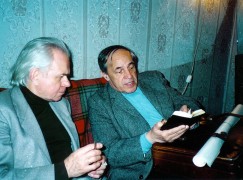The secret Soviet history of Pierre Boulez
mainIt was 49 years ago today that the BBC Symphony Ochestra landed in Warsaw for an East European tour, only to hear from the Russians that one of their two conductors was unacceptable.
Apparently, Gosconcert had assumed that Pierre Boulez was the assistant conductor to Sir John Barbirolli until some sharp-eyed ideologue spotted that he was a dangerous modern composer. The BBC were ordered to replace him.
By this time, they were on a flight to Moscow. On arrival there was a frosty champagne breakfast meeting with Gosconcert in which the BBC executive William Glock and the tour organiser Lilian Hochhauser were told once more to send Boulez home. Glock, Lilian tells me, stood up and said ‘if he goes, so does the orchestra.’
The Soviets backed down. Next, they objected to a Webern piece on the programme. Boulez agreed to replace it with an earlier Webern work, opus 6, which the commissars foolishly assumed would be less offensive.
In Leningrad, Boulez conducted his own piece, Eclats. The audience had never heard anything like it before and demanded an instant encore. ‘It was packed,’ says Lilian, ‘they were hanging off the balconies’.
Various Russian musicians have told me down the years that this was the moment their world changed. Suddenly, they realised there was more to music than the regime would let them believe.
At night in Moscow, Edison Denisov led a small group of composers up the back stairs to Boulez’s room in the Hotel Ukraine. Denisov began teaching his music secretly to select students. He kept in touch with Boulez and, on a return visit to Russia in 1990 (pictured), introduced him to the next generation of composers: Smirnov, Firsova and and more.
It is one of Boulez’s least-known achievements, but he helped to bring down the Soviet Union.

(c) Dmitri Smirnov





NRA/FoxNews summary of this piece:
“Glock kept Soviets at bay.”
On the other hand, it is noteworthy that Eclats didn’t lead to one, in Leningrad.
There’s actually no such work. It’s Éclat.
Now that the Russians can listen to all the modern music they want, do they still want to?
His so-called ‘music’ is never played in Russia.
For very good artistic reasons.
Although I realise that the neo-liberal luvvies just suck it up in Darmstadt.
Somehow, I think that in a hundred years, we’ll be discussing Pierre’s impact on the art more than what Eddie Mars thinks. Just sayin…
Eddie who? 🙂
Somewhere in 2008 or 2009 I had an interesting conversation with Gergiev about new music in Russia, about the loads of new Russian scores he is regularly sent. Many of them are explosions of wild dissonance and complexities, covering pages so large that they have to be turned by two people at a time. After composers were liberated from obligatory traditionalism, they felt they had to catch-up with the west to ‘develop’, to ‘modernize’. But Gergiev was perplexed rather than interested, as it seemed because of the unrealistic writing. Soviet Russia put a living thing, tradition, into a cage for political purposes, but it still survived there, and we have Shostakovich as a result – in spite of the cage. Now that Russian music is free, composers chose another cage, out of free will, like in the west.
Boulez’s Eclat and Explosante-Fixe are masterpieces. The only eclat (burst) or explosante-fixe (fixed explosion) that Maitre Mars ever made was in his toilet (which must be clogged by now). Eddie Mars=La Merde sans Maitre
r o f l m a o !
Oddly enough, the allegedly ‘wonderful’ music by this Gallic third-rater goes unplayed here in Russia from one year to the next.
And there is a very good artistic reason for this. What the French call ‘le chocolat’.
What, exactly, has this odious man ever composed of any actual worth? Where are his symphonies, his operas, his quartets?
Exactly.
I guess someone needs his nap. These and other temper tantrums about Boulez have always seemed childish. That adults still seem to put up such a fuss about a single composer whose core output comes from the late 40s through the early 60s is simply bizarre. If they don’t like his compositions (and there aren’t a lot of them and they tend to be performed only on special occasions) why not just ignore them instead of carrying on like this? Is it that other people think he was a great composer and they can’t tolerate a different opinion? Is it because they can’t tolerate that other people listen to it? Or is it that there were many young composers who found in his ideas a new path?
Correct me if I’m wrong, but it seems to me that this nuttiness only exists in music. I know of writers and painters who evoke such tirades and ad hominem attacks.
The irritation about PB is not merely about his work, but about an ideology he did his best to spread through music life on the expense of ideas of freedom, variety, diversity. Someone who set-out, because of his lack of understanding music life, to do such damage to a fragile culture, invites strong reactions. If he had quietly composed (like Dutilleux), and conducted his stuff, and wrote about it in purely technical and aesthetic terms, his work would have been one of the postwar possibilities, he would have been appreciated for his further development of sonic art as an alternative to music for people who got tired of ‘expression’, ‘pathos’, ‘spirituality’, ‘the human heart’ and the like, and wanted to be refreshed by pure sound and its intricate and often very interesting patterns. For nervous, anxious people, or people suffering from insomnia, pieces like Pli selon Pli offers balm to what has remained of their soul. But it has been his subborn attacks upon musical culture and his insisting upon a historicist view of 20C music history, which is ENTIRELY wrong, and which is – by the way – currently being revised in academia (begun by Richard Taruskin in his monumental History of Music), which still needs to be peeled away – because there are still many people in music life who do really believe that stuff.
I cannot resist the temptation to mention again the absurdist Darmstadt ‘piece’ that is the result of ignorant people taking the type of ideology of PB seriously and ‘develop’ it further down the line:
http://www.youtube.com/watch?v=jwlCD2y2tBA
John, thank you for readjusting the focus from the excessive hagiography that has so far been posted. I just think that in the case of Boulez he made more insufferably stupid comments – like trashing the music of Mozart and Shostakovich, never mind his desire to blow up the opera houses of the world, his hypocritical conducting stint at Bayreuth notwithstanding – than a good many other, very humble and modest composers and conductors.
Agreed….. But I always thought that B’s infatuation with Bayreuth was because of his identification with Wagner, cultivating the illusion that also he was such a historic musical figure of importance and meaning. His Ring was, to many people and I am among them, mediocre at best, too fast, and not giving space for the singers to breath, and the lines lacking the singing, expressive quality that Wagner always insisted he wanted. In conducting, and especially Wagner, there is a difference between volume and intensity and for PB only the first seemed to exist. PB wanted to ‘cleanse’ Wagner’s music from the traditional dust of overblown pathos, a good idea, but he exaggerated into the opposite direction.
We’ve had this discussion before – what you resent is that Boulez had a conception of music that you didn’t like and advocated on its behalf instead of just shutting up and staying out of the way. And if Boulez had just shut up and composed more composers fewer people would have gone down a more productive path. Correct? Well, while no one can ever know what would have happened if something else had not happened previously. I think that history shows that most art composed during ANY time is mediocre and typically does not outlive its time. So, a world minus Boulez in the late 40s is no guarantee of anything.
But all I hear when Boulez’ name comes up here is shouting and then more shouting back without any facts to back it up. But to be honest, I find the level of discussion on these subjects about the same as teen-agers arguing on fan blogs concerning their favorite boy bands. Maybe slightly bigger words, but it’s no different. And for that people should feel embarrassed. Hasn’t anyone here have at least a high school education?
For example: Pli Selon Pli is only good for those anxious, insomniacs with no soul. I have to say it made me laugh. I happen to have loved Pli Selon Pli from the first time I heard it as a conservatory student. I still do. I don’t know about how one judges the quality of the soul, but I still sit at rapt attention when I hear it and marvel at its beauty. I could talk about it in an adult fashion but I’m not sure very many people have the patience for such a discussions. But there is no reason why one cannot love both Pli Selon Pli and any work by Bach, Mozart, or Brahms.
I repudiate your petulant expostulations.
Deplorably squalid and contemptible comments from ‘Eddie Mars’. Like all such utterances, they tell us more about the writer than about the victim of his spite.
I agree with both of you. Eddie Mars writes as if he is either an insolent boy or an old man who is slowly going senile.
Actually, the latter might well be true, seeing as it also explains his strange, inexplicable obsession with George Osborne.
Sadly he has all the credibility of one of those fried Mars bars they like to eat in Scotland.
Just ignore.
Ad hominem GARBAGE from our resident *TROLL*
‘John’ – the SPAMMER who never writes about music, due to his utter IGNORANCE.
Have you forgotten your medication, Edward?
Ignorance is a good word to describe your feelings towards Mr Boulez, and disrespect is a good word to describe your comments about him on the day of his death.
To get back to the article itself:
It appears that Believe it or not in 1983 Melodya issued an LP from these concerts (dated January 8 and 10, 1967) on Melodya C90 18745 00.
The disc was called Pierre Boulez in Moscow and contains
Side A: Stravinsky Song of the Nightingales, Boulez: Eclats;
Side B: Berg: Altenberg Lieder, Webern: Six Pieces for Orchestra, Op. 6
Dan
How mean of you to deflate a nice heartwarming story for the older generation, with the evil Russkies being the proper bad guys, and our good guy bringing down the bastards single-brain-handedly. Pierre B. Rambo VII, Morricone was already signed to write the music for it (well the studio bosses wanted it to be a hit)
Quite fascinating. Thanks for posting Norm.
Concerning the return visit to Russia in 1990:
http://www.classicstoday.com/review/cd-hell-boulez-defeated-moscow/
“I am for 300% Leninist” (PIerre Boulez)